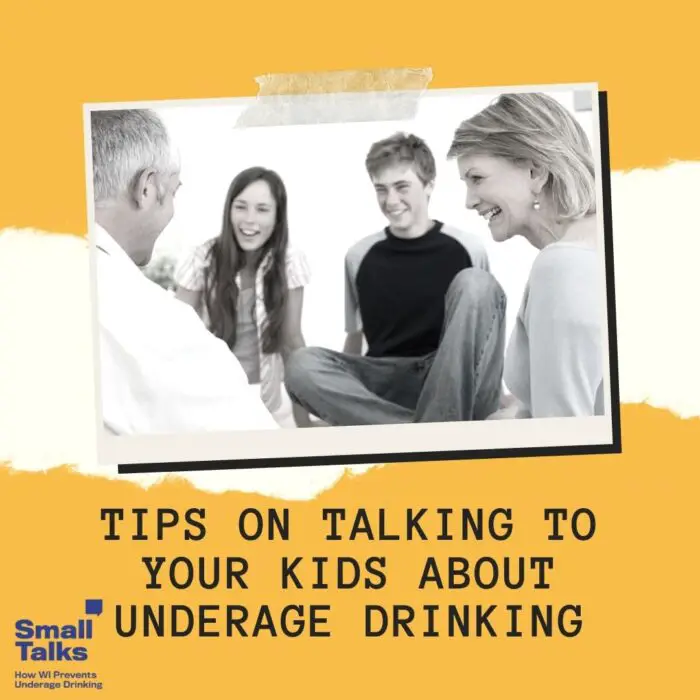If you’re a parent of a tween or teen, then you have likely entered a whole new ball game when it comes to parenting. Your child is growing up, finding themselves, and perhaps being a bit disobedient at times. This is typical and normal behavior in kids, but now is not the time to take a step back. Keep the lines of communication open with your child, and have those hard discussions. This may be the time to talk to kids about underage drinking, and other difficult topics. I’m sharing information in this article in partnership with Small Talks, Wisconsin Department of Health Services, though opinions are my own.

While you’re having these conversations with your child, I feel that it is important to try not to alienate them. The way that you come across in discussions can make or break the conversation, so perhaps gather your thoughts, or even do some research before you sit down to talk with your child. Try not to yell or scream, yet remain calm, and try to keep an open mind if and when he or she comes at you with questions. Having small, casual conversations can help, and giving them 3 fast facts can help to open those conversations.
3 fast facts underage drinking statistics
These statistics are for the state of Wisconsin, though they may be similar in your state.
- About their friends – A lot of kids believe “everybody does it.†But underage drinking isn’t as popular in Wisconsin as you’d think.
– 70% of Wisconsin teens say they don’t currently drink. 1
– Teen alcohol use is at its lowest rate ever in Wisconsin. 1
– Only 16% of Wisconsin high schoolers report using alcohol before age 13. 1 - About their brain – Alcohol affects kid’s brains more powerfully than adults, and drinking before the brain is fully grown can have devastating effects.
– Drinking alcohol can slow a teen’s brain activity for weeks. 2
– It can damage the parts of the brain responsible for learning, memory, and self-control. 1
– Underage drinking can have long-lasting effects that continue to impact kids’ brain functions when they’re adults. 3 - About the risks – Alcohol affects kid’s brains more powerfully than adults, and drinking before the brain is fully grown can have devastating effects.
– 17% of kids who drink have been in a car with a driver who’d been drinking alcohol. 4
– Drinking can lead to issues at school, with friends, and with the law. 5
– Underage drinking is associated with higher rates of depression, anxiety, and suicide. 5 - About Binge Drinking – Loosely defined as having 4 or 5 drinks in just 2 hours, binge drinking is especially dangerous for kids.
– Around 90% of underage drinking is binge drinking. 5
– Kids who drink are more likely to experience alcohol poisoning. 5
– Binge drinking lowers inhibitions at a time when youth are already eager to take risks. 2
1 Wisconsin Youth Risk Behavior Summary Report, 2017.
2 Alcohol & The Adolescent Brain: Immediate Impairment, Long-Term Consequences, 2016
3 Alcohol’s Effects on the Adolescent Brain: What Can Be Learned from Animal Models.
4 Youth Risk Behavior Surveillance – United States, 2017.
5 Alcohol & Public Health Fact Sheet: Underage Drinking, 2018.

How to Talk to Kids About Underage Drinking
Like I mentioned above, the way that you talk to your kids about sensitive topics like underage drinking is very important. Try to keep the conversation casual, and keep your empotions in check. Let your kids know what you expect out of them, yet try not to be judgemental. They need to feel comfortable coming to you if and when they have a problem.
When discussing drinking with your child, ask open ended questions so that there are no straght up yes or no answers. When they talk, listen! This is absolutely important, because kids don’t want to feel like they’re not being heard, or that they are being lectured.
What can you do as a parent
Most of all, be present and stay involved in their life. Have meals together, do fun things or hobbies together. Kids tend to be more open with parents that they feel close to. Know where your child is, what they are doing, and who they are with. You may even want to meet your child’s friends’ parents.
Set a good example for your child by drinking in moderation, if you do drink. Try not to let alcohol be your source cof stress relief, and instead use things like music, laughter and socialization. It’s also a good idea to keep any liquor in your home locked up. Most importantly, be someone who your child can look up to and trust. They need to be able to feel comfortable coming to you in difficult situations.